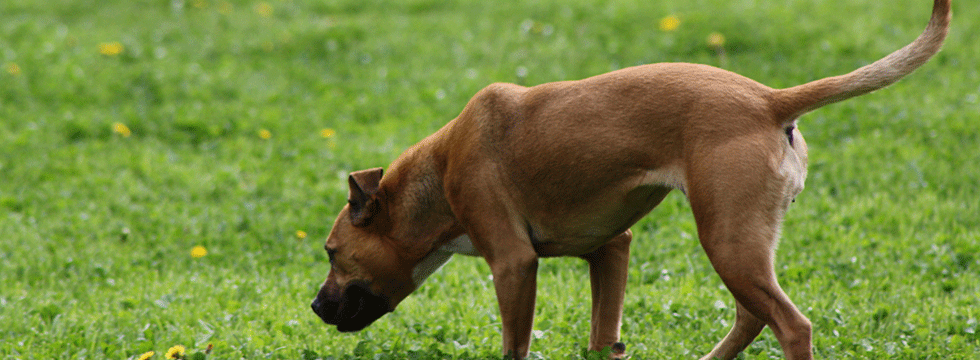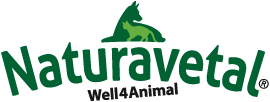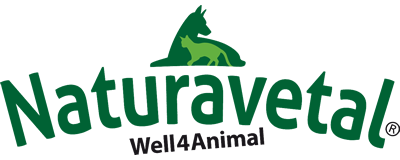
My dog eats faeces – what can I do?
The fact that dogs eating the faeces of other carnivores or herbivores is a very common phenomenon and usually perceived by the owner as annoying or unpleasant. This is called coprophagy. Nature shows, however, that even the wolf and wild dogs sometimes gnaw on tree bark, eat unusual herbs that they otherwise avoid and also eat the faeces of their own or a foreign species, which can be helpful as it provides a variety of nutrients. Scientifically, this so-called “self-medication” of animals is being investigated more closely. The assumption is that the dog lacks something and therefore he eats the faeces of others in order to fill the void.
If a dog eats faeces, there may be a problem in the intestine
A very common reason for dogs eating faeces is that the intestinal flora of the dog is disturbed. The healthy intestine contains a variety of live good bacteria that tolerate a few bad, so pathogenic bacteria can be kept in check. It is possible to defend the intestine and control the existence of active foreign pathogens or worms in the intestinal tract and immune system.
Unfortunately, there are many reasons that can shift this balance in favour of the bad intestinal bacteria. Once this cycle has started, a vicious circle can develop – resulting in conditions such as skin eczema, allergies and intestinal disorders. The dog, however, senses early on that “something is no longer right” in his intestine and tries to colonise his own microbial flora with good bacteria through the possibly existing gut bacteria in the faeces of other species.
A dog eating faeces from other dogs
Unfortunately, it is the case that many industrially produced feeds are made with added flavorings, flavor enhancers and additives – which are then found in the faeces of other dogs. These attractants can be so convincing to the dog’s nose that it instinctively eats the faeces even in good health. The dog perceives the smell as “attractive” and not as malodorous. However, our dog cannot fulfill its actual goal of helping improve its good intestinal bacteria, because manure made of industrially produced feed with synthetic additives is very unhealthy. Eating other dog faeces cannot provide support for the intestinal flora of dogs. In addition, there are the burdens from inferior raw materials and the synthetics.
Since most dogs get industrially produced food every day, it is important not to let our animals eat the faeces of other animals, but to prevent them by fair but consistent education.
My dog eats faeces but I do not know why
In order to narrow down the reasons for eating it, ask yourself the following questions:
- Which food does your dog get?
- Could a defect be present?
- Could it be a behavioral disorder, such as old habits or imitation of other dogs that eat faeces?
- Which faeces is the dog interested?
- Can one conclude from this that there is perhaps something lacking?
- For how long / often has this problem been occuring?
- Could the puppy ever build up a good intestinal flora by feeding on a high-quality, species-appropriate food?
- Has there been antibiotics or worming in the past that could have affected the intestinal flora?
Of course, if it’s an actual deficiency, it will be difficult to find out what the dog is lacking without a detailed blood test. However, you can optimize your pet’s diet by adding a rich, natural supplement. If the dog then stops eating it, you are already a big step ahead.
Naturavetal-Tip
Canis Extra Aktiv – dietary supplement with minerals, vitamins and trace elements, can prevent nutritional deficiencies
Canis Extra Mineralmoor – The variety of nutrients in Mineralmoor can boost the mineral balance, which can have a positive effect on the dogs’ diet-related extermination and help to make this behavior superfluous. The unique composition of the natural mud/bog can stimulate the metabolism, contribute to an upswing of the intestinal flora and thus promote the overall utilization of the feed.
However, if a deficiency is ruled out, one must continue to search and clarify why this behaviour persists. Find out when the last deworming took place, whether the dog suffers from diarrhea more often, receives medication or the intestinal flora is perhaps damaged.
My dog is healthy but still eats faeces – how can I stop it?
- Keeping the dog on a leash. The owner can control its running radius and the dog cannot disappear into the bushes or onto the field, where the owner can no longer act.
- Distraction. If the owner catches the dog while eating it, he should make a startling noise or a short sound to distract the dog’s attention from the droppings and push and remove them.
- Punishment. A later punishment does not make sense, it should happen only when the offence is made.
Other possible reasons for eating dog faeces - worm infestation
A strong worm infestation can be the triggering factor for eating “faeces”, as this can significantly disrupt the digestive processes of a dog. In this case, we recommend a faeces examination and only take a worming cure if there are worms present. Unnecessary chemical worming treatment damages the intestinal flora and does not lead to improvement of the bowel/intestinal tract. In the case of mild worm infestations, Canis Extra Vermcurat can support the inner intestinal care by diet. If no worms are present, Canis Extra Vermprevet is recommended as a promoter of a healthy intestinal environment and the balance of good gut bacteria.
Other possible reasons for eating dog faeces - disease of the pancreas
A disease of the pancreas, a pancreatic insufficiency (pancreatic under-function) can contribute to the fact that the dog begins to eat faeces. Pancreatic hypofunction causes insufficient production of digestive enzymes, such as amylase for carbohydrate cleavage, trypsin and chyrotrypsin for protein cleavage and lipases for fat loss. If the dog lacks these enzymes, he can get used to self-helping himself by eating faeces. If no other measures result, the owner may have the pancreatic function examined.
Naturavetal Info
Do you need more advice on the topic “My dog eats faeces”? We are happy to help: 0208 – 531 7804 | info@naturavetal.co.uk






